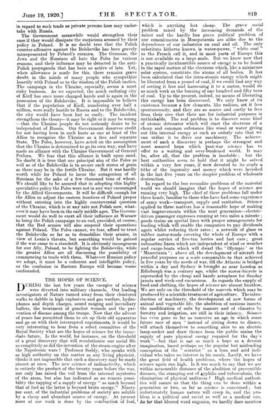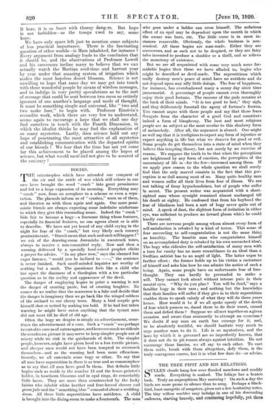THE HOPES OF SCIENCE.
DURING the last few years the energies of science were diverted into military channels. Our leading investigators of Nature turned away from their cloistered walks to dabble in high explosives and gas warfare, hydro- phones and depth charges, sound ranging and incendiary bullets, the treatment of gunshot wounds and the pre- vention of disease among the troops. Now that the advent of peace has permitted them to set up their old apparatus and go on with their interrupted experiments, it would be very interesting to hear from a select committee of the Royal Society what are the hopes of science for the imme- diate future. Is the world, for instance, on the threshold of a great discovery that will revolutionise our social life as completely as did the invention of the steam-engine after the Napoleonic wars ? Professor Soddy, who speaks with as high authority on this matter as any living physicist, thinks it not impossible that such a discovery may be made almost at once. The new science of radioactivity, which is entirely the product of the twenty years before the war, not only has raised the veil from the internal mysteries of the atom, but also has indicated as no remote possi- bility the tapping of a supply of energy " as much beyond that of fuel as the latter is beyond brute energy." Ninety per cent. of the industrial problems of society are soluble by a cheap and abundant source of energy. At present most of our work is done by the combustion of fuel, which is anything but cheap. The grave social problem raised by the increasing demands of the miner and the hardly less grave political problem of our commitments in Mesopotamia are alike due to the dependence of our industries on coal and oil. The only substitute hitherto known is water-power, " white coal " as the French call it, and in most parts of Europe this is not available on a large scale. But we know now that a practically inexhaustible source of energy is to be found in the rapid motion of the electrons which, like a miniature solar system, constitute the atoms of all bodies. It has been calculated that the intra-atomic energy which might be liberated from a pound of coal, if we could find any way of setting it free and harnessing it to a motor, would do as much work as the burning of one hundred and fifty tons of coal. Up to the present, indeed, no means of liberating this energy has been discovered. We only know of its existence because a few elements, like radium, set it free spontaneously, and they are so scarce and costly to free from their ores that their use for industrial purposes is unthinkable. The real problem is to discover some kind of atomic detonator which will start the electrons of a cheap and common substance like wood or water giving out this internal energy at such an orderly rate that we can utilize it to drive our machinery. The achieve- ment of such a discovery is perhaps the strongest and most assured hope which post-war science has to offer to a waiting and over-burdened world. It may be, after all, that the problem is insoluble ; but the best authorities seem to hold that it might be solved within a very few years, if men devoted to its study a tithe of the ingenuity and money which were lavished in the last five years on the simpler problem of wholesale destruction.
In regard to the less recondite problems of the material world we should imagine that the hopes of science are running very high. The chief of these problems fall under three heads, familiar to those who have had some experience of army work—transport, supply and sanitation. Science applied to these matters has a reasonable hope of making vast improvements within the next generation—electric- driven passenger expresses running at two miles a minute ; goods trains on special lines with proper arrangements for loading which will enable the companies to pay dividends again whilst reducing their rates ; a network of glass or rubber motor-roads covering the whole of Europe with a regular service of five-ton lorries and fast cars ; great subreatiee liners Which are independent of wind or weather and cargo-boats which will dwarf the ' Olympic ' or the Mauretania ' ; above all, the development of aircraft for peaceful purposes on a scale comparable to that achieved in five years by the needs of war, till the Atlantic is bridged within a day and Sydney is brought as near London as Edinburgh was a century ago, whilst the motor-bicycle is superseded by the cheap and handy aeroplane for Sunday jaunts and week-end excursions. As regards the supply of food and clothing, the hives of science are almost limitless. We are only on the threshold of the marvels which may be produced by a scientific treatment of agriculture. The intro- duction of machinery, the development of new forms of animal and vegetable life, the abolition of noxious insects: the modification of soils by manure and of climates by forestry and irrigation, are still in their infancy. Science has even gone so far as conceive an age in which some future race of men " instead of sitting down to dinner, will attach themselves to something akin to an electric lamp-socket and draw thence from the public mains the supply of pure physical energy required for the day's work "—but that is not so much a hope as a devout imagination, based perhaps on the popular but misleading conception of the " scientist " as a lean and and indi- vidual who takes no interest in his meals. Lastly, we have the great field of health problems, where the hopes of science again run high. Is it too much to say that we are within measurable distance of the abolition of preventible diseases, the stamping out of ayphilis and tuberculosis, the elimination of physical unfitness ? High medical authori- ties will assure us that the thing can be done within a generation or two, so far as science is concerned ; but unfortunately human nature will creep in, and the pro- blem is a political and social as well as a medical one. As for that blessed word eugenics, we hardly dare mention it here, it is so beset with thorny dangers. But hope is not forbidden—as the troops used to say, some hope. We have only space left just to mention some subjects of less practical importance. There is the fascinating question of other worlds—is Mars inhabited, for instance ? Every argument from analogy leads to the conclusion that it should be, and the observations of Professor Lowell and his successors incline many to believe that we can actually watch the Martian seed-time and harvest year by year under that amazing system of irrigation which makes the most hopeless desert blossom. Science is not unwilling to hope that some day we may get into touch with these wonderful people by means of wireless messages, and to indulge in very pretty speculations as to the sort of message that could be sent between two races so entirely ignorant of one another's language and mode of thought. It must be something simple and universal, like " two and two make four," to begin with. Professor Einstein's recondite work, which there are very few to understand, seems again to encourage a hope that we shall one day find ourselves in touch with the Fourth Dimension, in which the idealist thinks he may find the explanation of so many mysteries. Lastly, does science hold out any hope of penetrating the most attractive of all mysteries and establishing communication with the departed spirits of our friends ? We fear that the time has not yet come for this achievement to be placed among the hopes of science, but what would manAind not give to be assured of the contrary ?







































 Previous page
Previous page